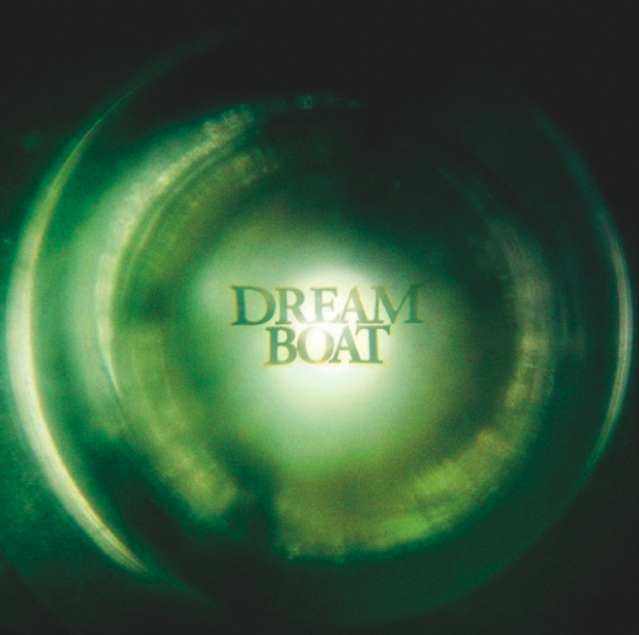Too much talk about a band’s affiliation or tangential relationship to the once-defunct/now semi-resuscitated Elephant 6 Collective/Recording Company can lead to some unintentional assumptions. Though in the case of Athens, GA-based Dream Boat some of those assumptions do turn out to be fairly accurate. Daniel Donahue and Page Campbell weave hypnotic tales of love and loneliness, utilizing a strange kind of minimalist folk distortion to create a hazy pop landscape that obscures and protects, even as it threatens to overwhelm. And within the psych-pop canon of releases like Black Foliage and Her Wallpaper Reverie, Eclipsing finds its own corner to hunker down and watch as those hallowed recordings come and go, all the while collecting and cataloging new sounds and influences. But Donahue and Campbell are no mere scene spectators, and they are not new-born psych devotees. Before Dream Boat, Campbell split her time between the atonal orchestrations of Dark Meat and the old-timey harmonies of Hope for Agoldensummer, and Donahue contributed lyrics and backing instrumentation for of Montreal and Elf Power, among other E6-related bands.
Not content to merely rehash the sounds that they find themselves entangled within, Dream Boat make subtle psychedelic music with as many ties to the folk lineages of Nick Drake and Tim Buckley as it does with bands like The United States of America or The West Coast Pop Art Experimental Band. Campbell’s delicate vocals, not unlike Catherine Rebeiro’s, lend the whole proceeding an almost ethereal air, where the most casual intonations feel immense and where a simple acoustic guitar can sound like a wall of sound. Dream Boat has the ability to make small moments seem incredibly significant. And it’s in these small moments—the gentle echo of an acoustic guitar, a slight distortion surrounding Campbell’s spacious vocals, Donahue’s exacting arrangements—that the beauty and full scope of the band’s ambition really shines through.
The album approaches its subject matter tentatively with opening track “Picture” gently ushering the listener into the band’s fractured folk aesthetic. Campbell’s vocals hesitantly intertwine with the softly plinking keyboards and droning distortion, seemingly caught up in some intangible updraft. As lightweight and insubstantial as the song initially appears, there is a quietly forceful intent that gradually builds and carries over into follow-up track “Sea to Sky,” as if this first song was just one long extended intro leading into the next. Mixing acoustic guitars, violins, horns, and a skulking distortion, “Sea to Sky” constructs itself out of these separate pieces into an enormously affecting cascade of sound. “Eclipsing” draws back to Campbell’s time in Hope for Agoldensummer with layers of circular harmonizing vocals reminiscent of inverted Carter Family hymns. Other songs like the rural backwoods drift of “Done” or the pastoral hum of “Fever of My Dreams” evoke dead-end roads and an encroaching darkness. The subtle drones and electronics that take cover among the dominant instruments seem to mask everything in a haze of musical ephemera that casts long shadows over everything.
These incredibly detailed narratives feel so lived-in and authentic that even a slight stumble, such as the unnecessary interstitial “Wayless,” feels more pronounced than it might have otherwise. A few songs like “Be Beautiful” and “Broke Open” become somewhat interchangeable as well, as the distorted Appalachian rank and file atmosphere can, at times, begin to feel a little worn. But the majority of the songs on Eclipsing manage to rise above any easy categorization and any misstep feels slight at worst. Any perceived disparity between the sometimes-at-odds aesthetics are effortlessly smoothed out by the band, and the unity displayed in the first few songs wins out over any fragmented individualism that seems to occasionally spring up.
The album does reach a pronounced peak as the last two tracks, “No Trouble” and “Let Go,” combine the casual rustic swagger associated with the best of folk music interspersed with the wide-eyed sense of discovery that comes from constantly pushing the boundaries between musical genres. The airy vocals on “No Trouble” lead into the foreboding strings on “Let Go” without so much as a backwards glance, and the album draws back from the listener, creating a sense of doubt and restlessness that leaves us questioning our assumption about the preceding songs. Far from the easy way out for an album like this, Eclipsing chooses the darker, more opaque route—there are no substantive answers, only the next song.

